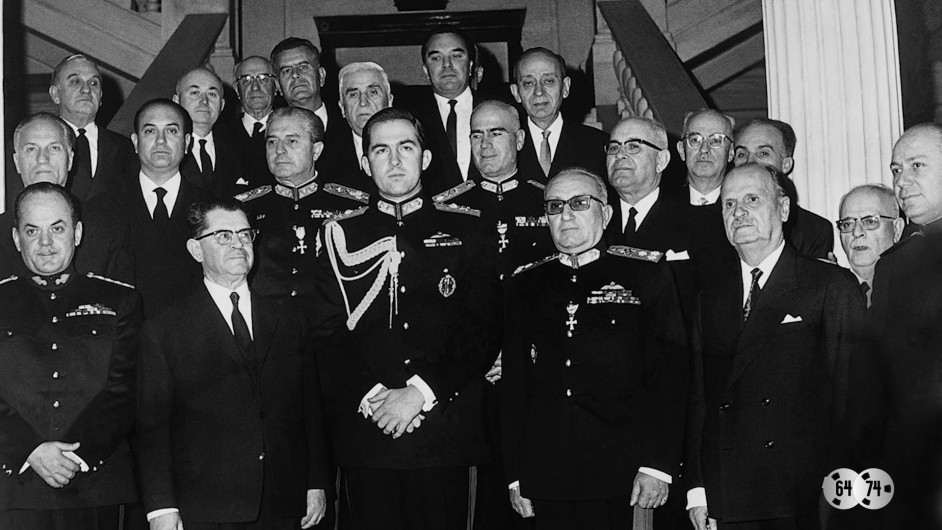Today in 1967 the junta of the colonels that lasted 8 years – one of the black pages in the history of the Hellenic Republic
“Exploded military movement – Political men arrested“, Is the title given by”Everyday»In a small Mesostilo, which was published in the sheet of April 21, 1967.” The 2.30 morning armor captured the center of Athens. Under the stunned looks of the few Athenians, who are being seized, at this time, armored armor excluded the old palaces, while military forces seized OTE, EIR’s radio chambers, in Zappeion and the Ministries. At the same time, the publisher of “Kathimerini”, Helen G. Vlachoushe was in her office – then centrally to the newspaper on Socrates Street – and from her window she saw the chariots on the streets of Athens.
At dawn April 21, 1967Greece woke up to a new reality: Democracy has been overthrown, the Constitution has been suspended and a group of army officers, led by the Colonels George Papadopoulos and Nicholas and the brigade Styliano Patakoshe has understood power. A coup that surprised almost everyone and was about to lead the country to a seven -year dictatorship at heavy costs for democracy and society.
OR instabilitythe distrust across Palace and the reinforcement of his role Andrea Papandreou They multiplied the fears of the conservative elite and the backstage centers of power.
OR dictatorship But the colonels did not come from nowhere. It was the culmination of a profound institutional and political crisis that had its roots in the post -war Greek state, the Cold War and the chronic contradictions between democratic legitimacy and the “deep state” of the Armed Forces, the CYP and the Palace. Following the victory of the Union Center in the 1964 elections and the dramatic events of July 1965 – which became known as “Apostasy” – Greece entered a continuous political impasse. Instability, mistrust of the palace and the strengthening of the role of the rising Andrea Papandreou multiplied the fears of the conservative elite and the backstage centers of power.
In fact, Triandria Papadopoulos, Makarezou and Patakou were not the only ones who were preparing a coup. Similar diversion plans had already been devised by generals with the support of the palace circles. The anticipation of postponing the May 1967 elections and imposing a temporary “legal” dictatorship by senior officers was pervasive. But the generals hesitated. This indecision has left room for the most decisive, as ruthless, a group of “techniques” of conspiracy.
King Constantine was found before and despite the initial reservations over the new government.
Papadopoulos, due to his term in the CYP and his relationship with the American Information Mechanism, was aware of the interconnections to organize the business with conspiracy professionalism. Patakos, controlling the armor units in Goudi, was the performer, while Makarezos, from key positions, cultivated the climate of fear and uncertainty to justify an “extraordinary solution”. It is said that they had warned politicians and ministers clearly: “If you do not move, we will do something on our own.” And they did.
On the pretext of the risk of communist overthrow and the “threat” that Andreas Papandreou was supposed to be junta He made mass arrests and censorship, the declaration of military law and the abolition of any democratic institution. King Constantine was in the past and, despite his initial reservations, swore the new government, legalizing it, in a way.
The support that the regime eventually received from the military US mission was clear.
In the background, the US attitude was ambiguous. While the Embassy in Athens and the CIA station were aware of Triandria’s moves, Washington did not immediately gave “green light”. On the contrary, he chose a standby attitude. The “orange light” received by the conspirators from some American executives was considered enough. Papadopoulos’ personal contacts with Greek -American agents – human beings with common, extreme anti -communist beliefs – were critical, but they were never officially recorded. The support that the regime eventually received from the military US mission was clear, culminating in the statement of the CIA commander in Athens, Jack Mori, when he read the dictatorship as “rape of democracy”: “Well, how can you rape a prostitute?”
The coup on April 21, 1967 was a black page for Greece, which led to persecution, exile, torture and ultimately the national tragedy of Cyprus. The leaders of the junta were condemned in 1975 and the country went to a new phase of democratic normalcy with the return of Constantine Karamanlis from Paris on July 24, 1974.
Source: Skai
I have worked in the news industry for over 10 years. I have been an author at News Bulletin 247 for the past 2 years. I mostly cover politics news. I am a highly experienced and respected journalist. I have won numerous awards for my work.












